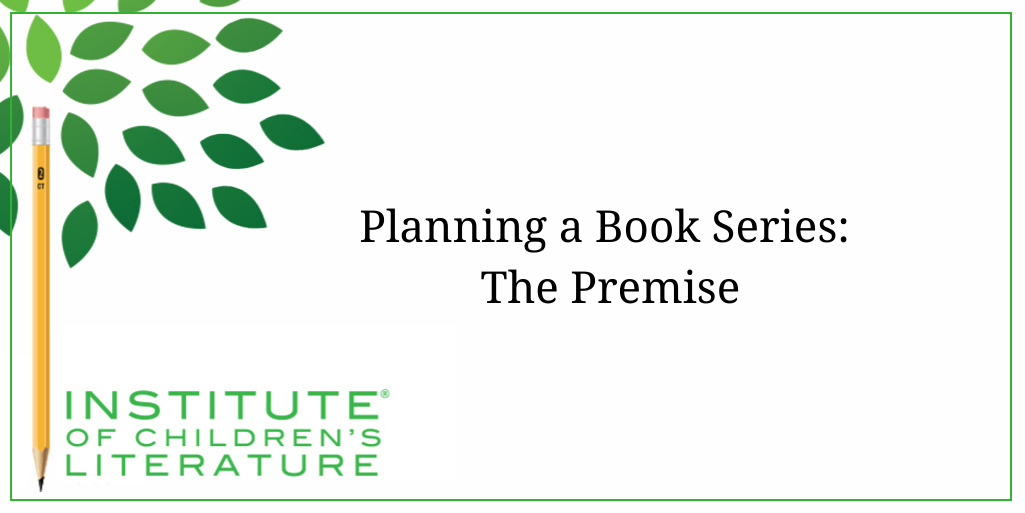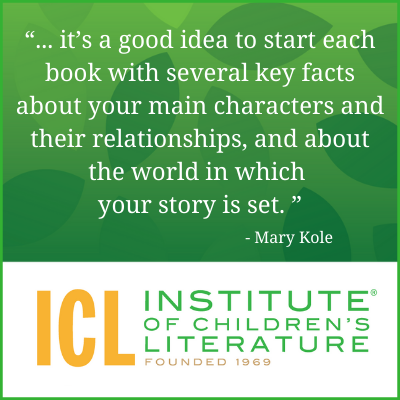
Your Voice or Theirs?
Voice, whether your natural writing voice or the voice of a character, comes from an emotional place. Jan Fields gives us exercises to develop these voices.

We teach our students how to write and get published!
View our Course Catalog >
All series books have a basic premise, something that links the books through time. For instance, my Monster Hunter premise focuses on an online series tracking cryptids that uses kids for camera crew, researchers, and tech support. This premise is a pretty easy one to plug new stories into as the group can go to new places to seek out new cryptids. Another series I created, Wellspring of Magic, had the premise of a group of girls who could open a gateway to a magical world, but only by working together. These are the basic mechanical parts of the premise. A good premise is interesting but also has repeatability.

In the last essay, I recommended taking care with character creation so you don’t have unsustainable quirks that you’ll desperately wish you hadn’t included when you have to drag them into every book. The same proves true for your mechanical premise. This can easily prove true if you add a difficult to handle mechanic. For example, suppose you want to write a series about mermaids, and suppose your mermaids aren’t going to be the kind who simply change from having tails to having legs with little to no effort. Instead, your character will absolutely need to do something to change into mermaids—maybe they can only be mermaids at night or they can only grow back legs at the moment when sunrise hits the water. It might sound romantic and magical on first use, but keep in mind that once you add this element, it’s going to go along with you through every single book in the series. This issue became very real for me in a series I created called Meri’s Mirror. In this series, the main character can talk to characters in the books she reads, but only through a magical mirror, a big magical mirror. So she’s rooted in one spot for any interaction. This created all kinds of technical issues in plotting a story with action.
Limits, especially in magical worlds, are good, but remember you’ll have to negotiate them all the time. So if you have a group of nine year olds who chase cryptids, you’ll be limited by what nine year olds can do. Nine year olds are generally shorter than adults. They are also usually not taken seriously by adults. They won’t be driving. They can snorkel but not scuba dive (something I ignored and got scolded for it in reviews). These limitations created some challenges in the extreme situations with the cryptids, but they needed to be kept in mind.
In book publishing, books are considered “high concept” if the premise of the book can be summed up in a single, attention-grabbing line. In series books, you are attempting to grab a reader for more than a single book. You want them to stay for book after book. In order to do that, your premise must be attention getting and promise something of an adventure inside. Now, that doesn’t mean all series books are adventure stories or fantasy stories or mystery stories or really any kind of high-tension type of book. The series can focus on a single family doing things families do and still manage to be a great series as long as you offer them something that will draw the reader back for book after book.
Sometimes the premise of the book and the main character of the book are really one and the same. A main character who has a distinctive voice, a unique point of view, and a tendency to action can become strong enough to carry a series. Consider classic characters like Ramona Quimby or Junie B. Jones. The stories that these characters star in are basically simple, contemporary stories about the normal things kids come into contact with, like new babies in the family or school challenges. The thing that makes the series work is the main character’s extremely strong, engaging personality. The character herself became the premise because the character is drawn so well that readers fall in love and will follow that character anywhere.
There is nothing more frustrating for readers than when an author creates an emotional premise for a series, then treats it as unimportant (or simply not existing) in other books. For example, if your series is about a group of kids whose parents work and travel with a carnival. The kids solve mysteries and the main character has extreme claustrophobia (which creates some tension between her and her dad, who is an illusionist who hopes his daughter will help out in some of the illusions). Now, the first book mystery has the claustrophobia as a key element, both practically and because of the emotional tension with the dad. But then you roll along with future books where she doesn’t really need to be claustrophobic for the story to work. Then you simply, forget, and you write a scene where the main character leads her group, crawling into a drainpipe to find a clue. Except she wouldn’t be able to do that, but you forgot. Or maybe you come up with a cool trick where her dad invents a new illusion involving his assistant (her mom) and his daughter, with the illusion making it appear that that mom magically grew younger. Only the only way for the track to work is for them to stand in a cabinet “time machine” with a passage between them so they can exchange places. Only your main character would never be able to do that.
As it turns out, it’s easier to forget the emotional premise than the mechanical one. You’re not likely to forget that your kids all have parents who work and travel with the carnival, but it’s easy to forget smaller, emotional details that played a part in one or more of the books but eventually seemed unimportant. Or perhaps you have the main character force herself to squeeze through the tight passage in book one in order to save her friends, but then decide that’s enough claustrophobia for her. She’s cured! Only it doesn’t work that way. So take care that whatever premise you put in play, you don’t forget.
A good multi-dimensional premise will give your series a solid place to stand so that you can maintain a sense of unity and a logical consistency throughout. It will lure in readers, hoping for a lively story and a cast they can follow from book to book. And it will be open enough to give you room to tell different stories each time, which still feeling cohesive. A good series writer is focused on the book at hand, but aware of all the books ahead at the same time. It can be tricky, but the resulting fans will believe in these characters, care about these stories, and follow you anywhere. And what more could we want?
With over 100 books in publication, Jan Fields writes both chapter books for children and mystery novels for adults. She’s also known for a variety of experiences teaching writing, from one session SCBWI events to lengthier Highlights Foundation workshops to these blog posts for the Institute of Children’s Literature. As a former ICL instructor, Jan enjoys equipping writers for success in whatever way she can.

Voice, whether your natural writing voice or the voice of a character, comes from an emotional place. Jan Fields gives us exercises to develop these voices.

Voice is something publishers want, but it’s an elusive thing to understand. Today, we discover ways to develop our own voice and the voices of our characters.

When writing conflict, inner and outer conflicts are not two separate things. Outer conflicts offer an opportunity to explore inner ones better. Find out how.
1000 N. West Street #1200, Wilmington, DE 19801
© 2024 Direct Learning Systems, Inc. All rights reserved.
1000 N. West Street #1200, Wilmington, DE 19801
© 2024 Direct Learning Systems, Inc. All rights reserved.
1000 N. West Street #1200, Wilmington, DE 19801
© 2024 Direct Learning Systems, Inc. All rights reserved.
4 Comments